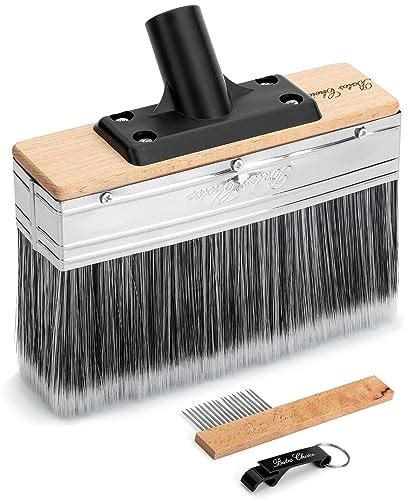Staining wood is a popular way to enhance its natural beauty and protect it from damage. However, achieving a flawless finish can be challenging, especially if you're new to woodworking or DIY projects. One of the most critical factors in achieving a professional-looking finish is using the right stain applicator tool. In this article, we'll explore the five best stain applicator tools that can help you achieve a flawless finish.
What is a Stain Applicator Tool?
A stain applicator tool is a device used to apply stain evenly and consistently to a surface. These tools come in various forms, including brushes, rollers, pads, and lambswool applicators. Each type of tool has its unique characteristics, advantages, and disadvantages. Choosing the right stain applicator tool depends on the type of project, the surface being stained, and personal preference.

Benefits of Using a Stain Applicator Tool
Using a stain applicator tool can significantly improve the quality of your finish. Here are some benefits of using a stain applicator tool:
- Even coverage: Stain applicator tools help apply stain evenly, reducing the risk of streaks and blotches.
- Consistent color: By applying stain consistently, you can achieve a uniform color tone.
- Reduced waste: Stain applicator tools help minimize waste by applying the right amount of stain to the surface.
- Time-saving: Using a stain applicator tool can save time and effort, especially on large projects.
Top 5 Stain Applicator Tools
Here are the top 5 stain applicator tools that can help you achieve a flawless finish:
1. Foam Brushes
Foam brushes are a popular choice among woodworkers and DIYers. They are inexpensive, easy to use, and work well on most surfaces. Foam brushes come in various sizes and shapes, making them suitable for small and large projects.

2. Lambswool Applicators
Lambswool applicators are a favorite among professional woodworkers. They are made from natural fibers and work well on large surfaces. Lambswool applicators are ideal for applying oil-based stains and can be used on vertical and horizontal surfaces.

3. Roller Extension Poles
Roller extension poles are perfect for large projects, such as staining a deck or fence. They allow you to cover more surface area quickly and evenly. Roller extension poles come with a foam roller and a extension pole, making it easy to reach high areas.

4. Stain Pads
Stain pads are a versatile tool that can be used on various surfaces, including wood, metal, and plastic. They are easy to use and work well with both oil-based and water-based stains. Stain pads are ideal for small projects and touch-ups.

5. Microfiber Applicators
Microfiber applicators are a modern alternative to traditional stain applicator tools. They are made from synthetic fibers and work well with both oil-based and water-based stains. Microfiber applicators are easy to use and leave a smooth, even finish.

Choosing the Right Stain Applicator Tool
Choosing the right stain applicator tool depends on several factors, including the type of project, the surface being stained, and personal preference. Here are some tips to help you choose the right stain applicator tool:
- Consider the surface: Different surfaces require different stain applicator tools. For example, foam brushes work well on smooth surfaces, while lambswool applicators are better suited for rough surfaces.
- Think about the type of stain: Oil-based stains require a different type of stain applicator tool than water-based stains. Lambswool applicators and microfiber applicators work well with oil-based stains, while foam brushes and stain pads are better suited for water-based stains.
- Consider the size of the project: Large projects require a stain applicator tool that can cover more surface area quickly. Roller extension poles and lambswool applicators are ideal for large projects.






What is the best stain applicator tool for large projects?
+Lambswool applicators and roller extension poles are ideal for large projects. They can cover more surface area quickly and evenly.
What is the best stain applicator tool for small projects?
+Foam brushes and stain pads are ideal for small projects. They are easy to use and work well on small surfaces.
What is the difference between oil-based and water-based stains?
+Oil-based stains are made from natural oils and are more durable than water-based stains. Water-based stains are made from water and are easier to clean up.
In conclusion, choosing the right stain applicator tool is crucial for achieving a flawless finish. By considering the type of project, the surface being stained, and personal preference, you can select the best stain applicator tool for your needs. Remember to always follow safety precautions and use the right type of stain for your project. With the right stain applicator tool and a little practice, you can achieve professional-looking results that will make your project stand out.
